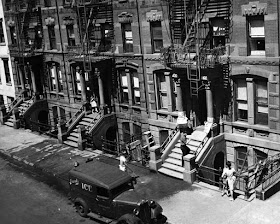A video featuring pictures of Buddy Holly with his band The Crickets, his wife Maria Elena, and friends. Soundtrack: "Oh Boy!", "Baby, won't you come out tonight?" and "Gone" by Buddy Holly ("Collected" CDs).
Like Paris, which nurtured the creative renaissance of the 1920s, New York in the fifties spawned half a dozen artistic movements, from abstract expressionism to the New York School of Poets and avant-garde breakthroughs like The Connection at Julian Beck’s Living Theater. New York was the cradle of formidable achievements ranging from fifties Broadway musicals (Guys and Dolls, My Fair Lady, West Side Story), to the folk movement, to Buddy Holly’s apartment tapes, to Brill Building rock ’n’ roll (Carole King, Leiber &Stoller). It was one of the city’s most romantic and glamorous eras, unforgettably evoked by Truman Capote in Breakfast at Tiffany’s.
The Greenwich Village alleys and byways that Buddy and Maria Elena haunted that winter are very different from the rest of Manhattan’s ledger-book grid. Positioned often diagonally to the rest of the city, Village streets are like a maze; they contain numerous surprises, such as the completely illogical intersection of West Tenth and West Fourth streets near Sheridan Square. “Buddy loved the jazz places,” Maria Elena says, mentioning the Five Spot, the Half Note, and the Village Vanguard. At Max Gordon’s Vanguard, a narrow cellar on Seventh Avenue, they could hear Thelonius Monk, John Coltrane, Gerry Mulligan, and Cannonball Adderley.
“We were always around the Village Gate,” Maria Elena remembers with fondness. In 1958 the Gate resounded with the sounds of R&B. Buddy, Eddie Cochran, Jimmy Bowen, Don and Phil Everly, Gene Vincent, and Buddy Knox had long been regulars there. Maria Elena was unable to pursue her own ambitions to be a dancer-actress. “After we got married, he said, `No, no. You don’t need to do that.` He wanted me to be around.” One day Buddy told her, “I want to do a classical score.” She marveled at the many-faceted nature of his genius. On her birthday in December 1958, Maria Elena persuaded Buddy to drink “a couple of glasses of champagne,” she later stated in Goldrosen and Beecher’s Remembering Buddy. He became seriously ill. As an ulcer sufferer (possibly, in part, from the stress of his career) he was playing with fire. As the New York winter set in, Buddy kept writing songs, the new tunes spewing out like an eternal fountain.
On December 8, 1958, he recorded “That Makes It Tough,” a blues number that dissects a broken heart with unflinching honesty. On 5 January, Coral released ‘It Doesn’t Matter Anymore’ and ‘Raining In My Heart’. That same week, Buddy received some New Year tidings which all but wiped his anxiety over his new single from his mind: Maria Elena told him she was pregnant. ‘He said, “When I get back, we’ll go to Lubbock together and tell Mother,” Maria Elena remembers. ‘Buddy told me “It’ll be just as nice if it’s a girl.”’ They agreed to delay breaking the news to their respective families until Buddy’s return from the ‘Winter Dance Party’ tour. –"Buddy Holly: A Biography" (2014) by Ellis Amburn
"Buddy's success gave us all hope. His experiences in Nashville, where they tried to change his unique style, had helped to mature him, make him more sure of what he was doing as an artist; we'd usually stop at the Night Owl, a drive-in hamburger joint on Broadway, looking for girls, cruising around town aimlessly. Actually, we didn't know what we were looking for, and I don't guess we found it. I've often wondered if Buddy wasn't flying that plane. He wasn't afraid. Everybody wanted to talk about the crash and why I gave my seat to the Big Bopper. Buddy was the first person to believe in me. All I could think about was what good soul he was, what a happy man. He was in love with his wife and his music. To this day it doesn't seem fair. I didn't want to sing. I didn't want to play guitar. I was empty, drained of hope." —Waylon Jennings
"Buddy's success gave us all hope. His experiences in Nashville, where they tried to change his unique style, had helped to mature him, make him more sure of what he was doing as an artist; we'd usually stop at the Night Owl, a drive-in hamburger joint on Broadway, looking for girls, cruising around town aimlessly. Actually, we didn't know what we were looking for, and I don't guess we found it. I've often wondered if Buddy wasn't flying that plane. He wasn't afraid. Everybody wanted to talk about the crash and why I gave my seat to the Big Bopper. Buddy was the first person to believe in me. All I could think about was what good soul he was, what a happy man. He was in love with his wife and his music. To this day it doesn't seem fair. I didn't want to sing. I didn't want to play guitar. I was empty, drained of hope." —Waylon Jennings







No comments :
Post a Comment